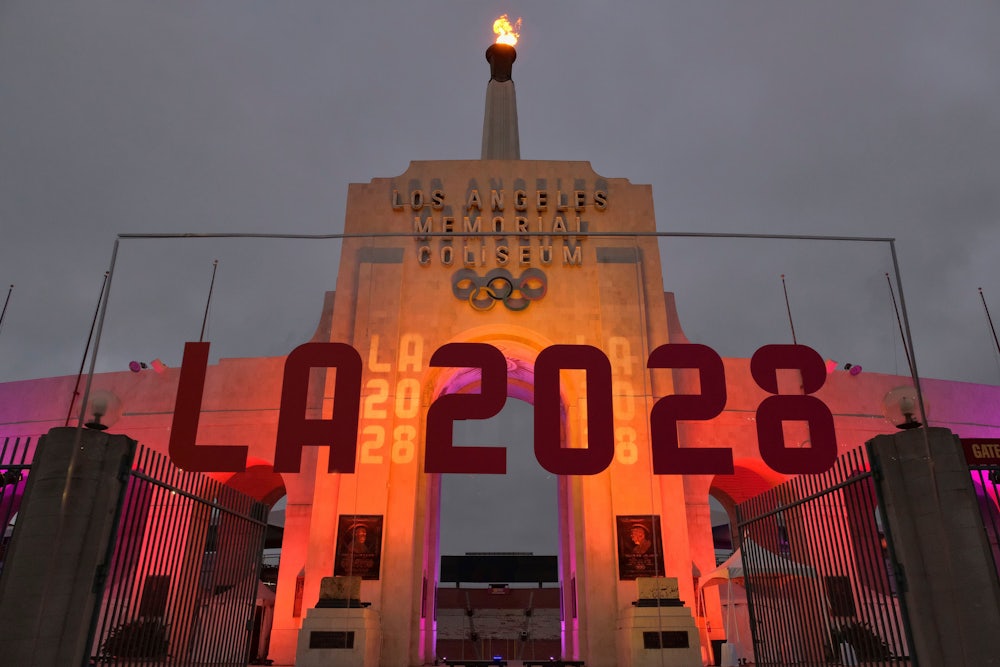The mold first appeared when a pipe in Dolores Hernandez’s bathroom started leaking. Then the pipe burst, and the mold crept to the shower curtain and onto the wall-to-wall carpet that had become a pond of murky puddles in the living room. She tried to contain it with daily scrubbing, but it soon took over the entire unit, thriving colonies of black mold on every surface.
Hernandez, 66, had lived in the Inglewood Gardens apartments for nine years when a new landlord bought the complex a few years ago, renaming it “Stadium View,” in honor of the new NFL arena, SoFi Stadium, just across the street—the most expensive sports venue ever built.
“That’s when my problems started,” she said.
The landlord installed new patio furniture, hung up café lights, and pulled up the real plants in the courtyard, replacing them with fake ones. More troublingly for Hernandez, the landlord hiked rents, forcing longtime tenants to leave in search of housing they could afford. Once they were vacated, he renovated each unit, updating appliances and making repairs.
Hernandez found herself in possession of what was suddenly a hot commodity: living quarters adjacent to a venue that would soon host the 2022 Super Bowl, the 2026 World Cup, and the 2028 Summer Olympics. There was a fortune to be made renting Stadium View units to short-term renters who come to town for spectacles (in 2019, Airbnb entered into a nine-year, $500 million partnership with the Olympics), if only Hernandez would get out. But she stayed put.
“I don’t have any money to move out,” she said. At the same time, she couldn’t afford to stay.
She reached out to the Lenox Inglewood Tenants’ Union, or LITU, a group of local organizers who advocate for renters. She said they advised her that the rent hikes were illegal, but when she told the landlord she wouldn’t pay the new rent, he threatened to evict her. The mold kept growing. (Hernandez’s landlord did not respond to emails asking for comment.)
LITU and some media-savvy fellow organizers from the activist collective NOlympics LA showed up at Stadium View with film equipment and documented the squalor in Hernandez’s apartment. They blasted the resulting two-minute video on social media, which led to offers of help from disgusted viewers. Volunteers arrived to pull up the soggy, saturated carpet, install new flooring, and paint the walls with mold-resistant primer.
It’s nothing you’d call a real victory. Hernandez is still paying $1,440 per month for a one-room apartment she shares with a roommate, and the bathroom is still overrun with mold.
Even so, resistance hasn’t been futile. A mutual aid network showed up to push back against the displacement apparatus that clears space for mega sporting events, and they helped improve Hernandez’s life. It’s slow, it’s incomplete, but the apparatus can be dismantled, piece by piece.
For residents, advocates, and organizers trying to minimize harm from these mega-events, there is much to dismantle. At the Los Angeles Homeless Service Authority’s most recent count, there were 41,290 people experiencing homelessness in the city of Los Angeles, a number that has nearly doubled under Mayor Eric Garcetti’s two terms in office. Garcetti, one of the most powerful and vocal boosters of the Los Angeles 2028 Games, has said repeatedly that the city can “end street homelessness” by the time the games come to town.
That plan doesn’t appear to entail actually housing people, however. Rather, it depends on a multipronged strategy of displacement. The gentrification of Inglewood and surrounding neighborhoods is one type of displacement; the physical removal of unhoused people from public spaces is the more visible counterpart. Ahead of this year’s Superbowl, held at SoFi, the California Department of Transportation “swept” (a euphemism for forcible relocation) tent encampments that tourists arriving at LAX were likely to see along the route to the stadium.
Ramping up displacement and increased surveillance and policing are traditional parts of preparing for the Olympics, typically starting years in advance of the games and then remaining in place as part of a city’s infrastructure. Los Angeles itself used the same tactics of sweeps and dislocation in preparation for tourists ahead of the 1984 Summer Games; officers on horseback descended on Skid Row to issue citations for jaywalking and chase away people sleeping on the sidewalks. An LAPD captain told the Los Angeles Times, “We’re trying to sanitize the area.”
“[This is] about the sequential building of technical expertise,” said Christopher Gaffney, an associate professor of geography at NYU. “Each [mega-event] is a learning experience. Each one progressively clamps down on the already marginalized. Street sweeping will be more effective next time.”
NOlympics LA has been working since 2017 to stop the 2028 Games. “There are multiple paths to cancellation, and they’re all still on the table,” the group has stated. “A lot can happen in the next few years as the Olympics grow in unpopularity both locally and around the world.”
With fewer cities putting in bids to host, as well as a marked drop in Olympics spectatorship over the last 10 years, we can conceive of the games as a bowling pin teetering in its lane, primed for the toppling—if not by 2028 then at some point in the not so distant future.
“Most folks, when they think about the Olympics, think, ‘Oh, that big show where it’s all fun and the whole world is smiling,’” said Eric Sheehan, an organizer with NOlympics LA. “What we’ve learned is the more that you teach people about the Olympics, the less likely they are to want it to come to their city.”
Sheehan and his colleagues leverage their media savvy in traditional ways, such as the video of Hernandez’s apartment, and by deploying comedy to deflate the pomp and hypocrisy around the games. One video project showed a series of “mayor auditions”—actors reading for the role of Eric Garcetti, whom they dubbed the “absentee mayor” for his many out-of-town excursions.
“As mayor of this city, I’m confident that by the time the Olympics come, we will end homelessness on the streets of Los Angeles,” the script read, quoting Garcetti. Then came an improvised twist: “If not, we’ll just ship them to Palmdale or the desert like we did in 1984.”
But the suffering of others can feel abstract or immutable, particularly when it’s on the scale of L.A.’s homelessness crisis. A more pragmatic approach to encouraging public action might be letting taxpayers know that they’re all but guaranteed to be footing the bill for the games.
The most recent projected budget for the 2028 Games is $6.9 billion, which the Los Angeles 2028 organizing committee says will be 100 percent privately financed by the International Olympics Committee, philanthropists, sponsorships, licensing, hospitality, and ticketing.
The budget also includes a $615.8 million contingency fund in case of cost overrun, which sounds like a healthy number—except that the average final cost of a given Olympic Games is 172 percent of the original budget. It can go even higher at times; the final budget for Rio 2016 was a 352 percent increase from initial projections. Sochi 2014 was a 289 percent increase. In L.A.’s case, if the Olympics run the average amount over budget, the contingency fund would fall short by nearly $4.4 billion. That discrepancy won’t be covered by the IOC or philanthropists; it will be taxpayers on the hook for billions.
When CalTrans swept away homeless encampments along the 405 freeway to prepare for tourists attending the Super Bowl, NOlympics LA called it a “practice run” for the displacement that would continue leading up to the 2028 Games. The wheels are greased for private profit, as in the flipping of the Stadium View apartment complex, years in advance of the games themselves.
Likewise, resistance to the games needs to begin as early as possible—ideally, before a city has even put in a bid to host. The only precedent for canceling an Olympics once a city was officially selected by the IOC was Denver in 1976, when the IOC was far less powerful. Public pressure is shutting down bids more and more often, however: Budapest, Rome, Boston, and Hamburg all withdrew their proposals to host the 2024 Games, leaving only Paris and Los Angeles as contenders. In 2018 alone, four cities canceled their bids to host the 2026 Winter Games.
“The reality is that the games will lose legitimacy among the core constituents of the Olympic movement, which is Western Europe and the United States, Australia, Canada, if those countries never host again,” Gaffney said. “One of the ways to do that is to have standing no-games committees form in those cities as civil society organizations that are fundamentally against public subsidy for private profit using sports events.”
Natsuko Sasaki, an organizer with the Paris-based anti-Olympics group Saccage 2024, shares Gaffney’s long view. When Tokyo 2020 was merely postponed by one year (rather than canceled) due to Covid, Sasaki said she was forced to reconsider her approach to abolition. “I really thought it was possible to cancel the Tokyo Games,” she said. “That was the biggest disappointment of my life. I learned, OK, it’s that hard to cancel the games.”
At that point, Sasaki decided to work toward bid prevention rather than cancellation after the games have been awarded.
“My focus is now turned to Sapporo, which is the most likely candidate city for the 2030 Winter Games,” she said. “If we can succeed [in canceling] the candidacy of Sapporo, maybe there will be no city at all for the 2030 Games. Maybe it can be the end of the Olympic Games.”
Boston organizers’ victory in derailing the city’s bid for the 2024 Summer Games relied in part on an inside-outside strategy of cooperation between grassroots activists and local power brokers. Denver also had state legislators and a determined public functioning together—one part of the team working from inside the government toward a desired outcome and another working from outside.
“That’s a pretty great recipe for change in general,” said Jules Boykoff, the author of NOlympians: Inside the Fight Against Capitalist Mega-Sports in Los Angeles, Tokyo & Beyond. “Certainly it’s been proven to be a good recipe for stopping the Olympics, or at least putting question marks around the Olympics.”
The most straightforward route to stopping the 2028 Games, if not the most plausible, is to persuade City Council members that making a stand for cancellation would be politically shrewd. But in the current environment, that stand would risk alienating the powerful developers who will benefit financially from the games, and would likely amount to political suicide, said Sheehan, the NOlympics LA organizer. Even politicians who privately tell him and his colleagues that they agree with the anti-Olympics analysis won’t go public with their conclusions, he said.
“Our leaders do not have the political will to do that,” Sheehan said. “And so popular opinion going against the games, and City Council deciding it’s no longer something that is worth it for us, is the number one way to do this.”
That outcome became more conceivable in June, though, when a handful of new City Council candidates with politics more compatible with the anti-Olympics analysis made it through the primaries and appear likely to win seats in the general election. In that same election, incumbent City Council member and traditional progressive Gil Cedillo lost his seat outright to community organizer Eunisses Hernandez, who will take office in December. As Sheehan pointed out, “Things can change very quickly in terms of what’s politically possible.”
That sense of possibility helps Sheehan and his colleagues, both local and in the transnational anti-Olympic movement, keep organizing despite the magnitude of the work ahead.
“If I can see no candidate city for future games, that will be my victory,” Sasaki said. “If I can see this at the end of my life, I will be very happy. But the sooner the better.”
This article was supported by the journalism nonprofit the Economic Hardship Reporting Project.


